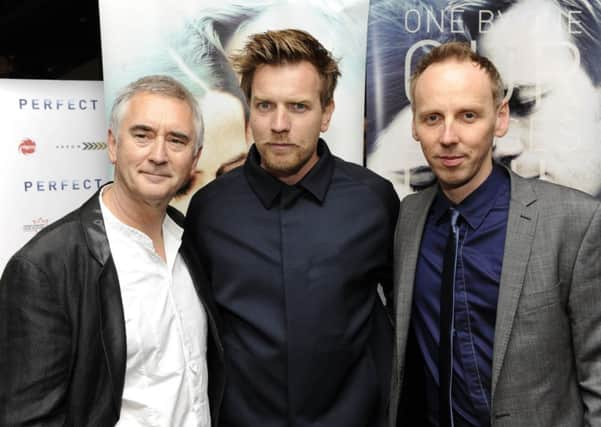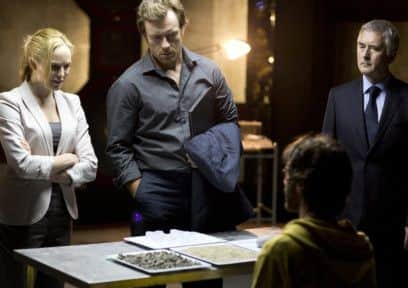Denis Lawson on The Machine and Ewan McGregor


CONSIDERING the acting industry is so driven by fragile egos and petty jealousies, Denis Lawson is surprisingly relaxed about the way he is increasingly being introduced these days. Rarely is he referred to simply as Denis Lawson, the actor we know and love from Star Wars, Local Hero and Holby City; more often it’s Denis Lawson, Ewan McGregor’s uncle. In case you didn’t know.
Little Ewan, bless his cotton socks, used to sit agog in his Crieff home when Uncle Denis came to visit, resplendent in flares and flowing locks (he was starring in an Amsterdam production of Hair at the time). “He was about eight or nine and I’d turn up in Crieff looking like a hippie: long hair, glam clothes,” says Lawson. “I think that’s what did it for him.” And he laughs heartily, happy to be in the shadow of the now more famous McGregor. “It doesn’t bother me at all,” he says. “I’m very proud of it. And I AM his uncle. He’s fantastic. We have a great relationship and that’s more important to me than anything.”
Advertisement
Hide AdWe’re meeting though, not to talk about his famous nephew, but Lawson’s latest film. Set in the near future, The Machine imagines a time when Britain is embroiled in a cold war with China, and the Ministry of Defence sets about creating a mechanised soldier, a thinking robot that will not only have the ability to fight, but to negotiate and keep the peace as well.


The film – a little like Blade Runner – raises questions about ethics and the use of artificial intelligence; the difference for Lawson is that, while the genre is still sci-fi, the concept is closer now than ever.
“The thing that drew me to the film, as is so often the case,” says Lawson, “was the script. It’s a brilliant script, written by Caradog James, who has also directed it. It’s essentially about artificial intelligence, and how far you can push it. Can you build a conscious machine that can think for itself? But one of the things is that it wasn’t set in the future, because we’re quite close to that reality already, some would say.
“I really loved the role of Thomson,” he adds. “He’s in charge of this complex which is developing the technology; he has complete control over it. I saw him as a kind of dictator, really. He has the power of, in a sense, life and death within that compound. He’s very dark but he’s also quite humorous and that was a really nice combination. And it was great working with Toby Stephens, whom I knew a little bit already. He’s quite an eccentric man. We got on extremely well.”
Taking on the role of the robot is the actress Caity Lotz, who also happens to be a breakdancer and a martial arts expert. “She’s about five foot three or four,” says Lawson, “and can stand on her feet, then lean back with her head on the floor then literally whip back up again. She started one fight sequence by pinning a guy to a wall with her leg up at his neck, then whopped him and moved on to about six or seven other guys. She’s fantastic.”
It’s already been enough to win her a best newcomer nomination in the Welsh Baftas, and earn the production best UK film at Raindance. For Lawson’s part, however, he’s already moved on and is now filming a series of the BBC’s crime comedy drama New Tricks with Dennis Waterman, Nicholas Lyndhurst and Tamzin Outhwaite, to be broadcast in the summer. “It’s great fun,” he says. “A lot of it’s hard work because of the nature of the material, but we manage to have a lot of laughs.”
Advertisement
Hide AdOddly for an actor, Lawson’s rarely been out of work in 43 years in the business – a fact he puts down to his ability to turn his hand to pretty much anything. “I am, I suppose, driven. I had this idea when I left drama school that if I could do everything, I’d always be working. So I knew I could sing – I’d sung from a very early age – and I discovered at drama school that I had a facility for movement and mime. So whenever I wasn’t working I was doing dance classes. It was all part of a plan, I suppose, that if I could sing, dance, act… and it paid off. It’s probably one of the reasons I moved to London so early, because I thought I might be able to make a mark on musical comedy, and I couldn’t do that in Scotland at the time. And that’s exactly what happened; that turned my career around.
“I’m also, I think, very funny,” he adds. “I do some very high energy comedy, vaudeville, music hall stuff, and people who’ve seen my work on camera, on TV and movies, would not really know that. And I haven’t had the opportunity to explore that on camera. But I have a very anarchic, wild side in my family genes. I think of myself as a light comedian.”
Advertisement
Hide AdLawson is, in fact, a seasoned and celebrated stage actor, having appeared, most notably, in the 1983 musical Mr Cinders, a version of the Cinderella story, for which he won the Olivier Award for Best Actor in a Musical.
“When I was very small, when I was five or six, that’s what I wanted to be. I wanted to be a song and dance man. Then I got a lot of inspiration from going to visit my grandparents in Glasgow, where I’d go to see variety. That made me want to do it as well.
“Whatever I’m doing, I want to be entertaining as well. No matter how heavy it might be, it’s more important for me to entertain an audience than anything.”
Lawson moved to London at the age of around 22. “It was hard for me to get away from my roots in Scotland,” he says. “I’m very attached to Crieff, where I come from, and it wasn’t an easy thing to do. At that time, it felt like a huge move. Of course, it feels like nothing now, Glasgow to London.”
His first gig was at London’s Roundhouse, just round the corner from Primrose Hill, where he now lives and where we meet in a local pub to talk. But the kind of Hollywood fame McGregor has achieved never really came his way, despite his celebrated role as X-Wing pilot Wedge Antilles in the original Star Wars trilogy in the 1970s and 1980s. He is also much loved for his part as Gordon Urquhart, the wry hotel keeper in Bill Forsyth’s 1983 Local Hero, which won a Bafta and also starred Burt Lancaster and Peter Riegert. There was the Kit Curran Radio Show, Holby City, Bleak House, The Wee Man...
“It’s a bit of a Catch 22 for me,” he says. “I’ve always been very busy here, in the UK, and I never had the patience to go to Hollywood and wait. I have no regrets about that.”
Advertisement
Hide AdHe turned down the opportunity to reprise his Star Wars role when George Lucas revisited the story in 2005, but when I ask him about it he just sighs wearily and won’t be drawn. “Honestly, I made the first Star Wars film in 1976 and it doesn’t really interest me. I know it’s interesting to other people but I get really bored talking about it. Sorry.”
He is, however, always happy to talk about McGregor. “I’ve directed him a couple of times – on stage and on film – then we did the movie in Glasgow, Perfect Sense, which I didn’t do very much in, but it was really nice to be on a set with him, we’d never done that before. The first morning I walked into make-up and he was sitting there… it was just weird. Then, walking on the set, it was effortless, the most natural thing in the world.”
Advertisement
Hide AdHe plans to pass on some of that sense of effortlessness to today’s drama students with a book, to be published in July. “It’s about an actor’s approach to a camera, how you relate to it, and also how the actor functions within a film unit,” he says. “I realised about 20 years or so ago that a lot of drama schools aren’t teaching it very well or at all. The profession has changed since I came into it. A lot of students will leave drama school and walk straight in front of a camera; they won’t go on stage because the opportunities aren’t there.
“We have a fantastic stage training in this country but the young actors I talk to now get on to a film set and it’s very disorientating. There are 50, 60 people running about, you don’t know who’s doing what or why, and how you’re supposed to operate. It’s very important to be relaxed in front of a camera, and that’s difficult if you don’t know what’s going on.”
So, after more than four decades in the business, is this his legacy? Is it time, aged 66, to slow down a little. “No. I feel I’m slipping into overdrive now,” he insists. “It’s part of my personality. I like to confound expectation. ‘Oh, so you’re getting a little older are you?’ Well watch this! It’s very much in my family. My mother retired at 79, so I have a great set of genes.”
The man – he’s a bit of a machine.
Twitter: @Ruth_Lesley
• The Machine is on general release from Friday; to buy, visit: http://bit.ly/1dWvvDm; http://amzn.to/1mreiY6; http://amzn.to/1oNarDm